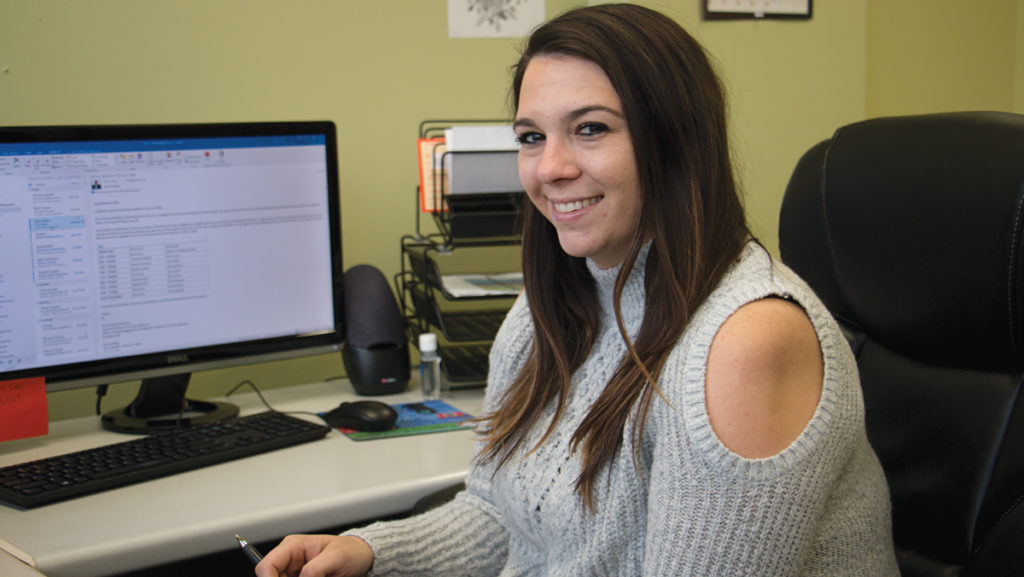The Office of Student Engagement and Multicultural Affairs (OSEMA), has hired Mary Holland-Bavis as assistant director of student involvement. Holland-Bavis has received bachelor’s degrees in political science and economics from SUNY Fredonia and completed her master’s degree at the SUNY University of Buffalo with a degree in higher education administration while serving as the graduate assistant in the Student Involvement Center at Medaille College in Buffalo, New York.
Holland-Bavis first began her career at Ithaca College in 2012, as the student organization business specialist. In 2014, she left to work as the program coordinator in the Office of Student Activities at Syracuse University. She held this position for three years.
Holland-Bavis started her position as the new assistant director of student involvement on Oct. 18. She replaces Theresa Johnson, who served as the assistant director of student involvement at the college since July 2010.
Contributing writer Elijah Joseph spoke with Holland-Bavis about her plans for student involvement and engagement.
This interview has been edited for length and clarity.
EJ: What experience are you bringing to your new role as assistant director of student involvement?
MH: So, I think I definitely have a unique experience in the fact that I’ve worked in OSEMA before. I think that one advantage that a lot of the student organizations have with me coming in is that they don’t have to explain who they are. I mean, there is obviously new organizations that I haven’t worked with and there [are] so many things I need to learn because I wasn’t in this position specifically, right? But I at least have that foundation of, I know where the Student Activities Center is. I know who the people you need to know in Campus Center and Event Services are, or even just within this office. So, I think that’s definitely an advantage that I’m bringing to the table, but also, I learned so much of my experience at Syracuse University. Bringing in speakers and putting on concerts and negotiating contracts and all that. So, it’s definitely something that was really challenging. So, I think that … those two experiences specifically, I think are definitely going to ultimately help the programming on campus because I can bring that knowledge and experience to them.
EJ: What are your goals and plans for student engagement on campus?
MH: I’ve been here before, but I don’t know all the things that changed … and the things that work and the things that don’t. My goal for at least the remainder of this semester is to just sit back and attend as much as I can, get to know as many students as I can and listen to them. And ask, “How can we make this process better, how can I be an advocate for you? How can I help you get to where you want to go, to accomplish the goals that you want to see done before you graduate?” That’s ultimately my goal, you know, these aren’t my programs. These are the students’ programs. It’s really just my job to assist from the side and help them get to where they want to go.
EJ: How do you hope to engage with students while in your role?
MH: I think as much as possible. You know, I think that that’s the best way to put it. You know, I already have so many student org events on my calendar that aren’t even organizations that I’m working with on an advising basis, because I think it’s important for me to see the events that the students are putting on. And all these students obviously care so much about the organizations that they are a part, and they want to make a difference on campus and within the Ithaca community, and they think I need to understand that and see it to be able to better help them. So, obviously, students should definitely feel free to reach out to me and invite me to anything they want me at, to see, to check out.
EJ: How do you plan to diversify OSEMA events and speakers?
MH: I think ultimately through my experience of, you know, bringing a very diverse array of speakers and just performers at Syracuse. I mean, I just know the different avenues that students can go down and the people to talk to. So, like, I think that I’m still learning, of course, but I definitely have a lot of experience being able to negotiate and bring in different people from kind of all walks of life. And being able to … show students how they can go about doing that. And maybe even just … asking the questions of like, “What you want to do?” So, I think that’s something I can definitely play a role with. As you know, I get more into this role and more aware of some things that are happening on campus.
EJ: How can you contribute to diversify student engagement on campus through different organizations?
MH: The short answer is the students have to let me know. If me being present at an event, or being able to connect students with other students… people across campus or maybe within the community is what they want and what they need to diversify their programs, absolutely I want to be a part of that. But also, connect with me is the first step, because obviously, I want the student orgs to be setting goals and reaching towards them. I think it’s important to set up that meeting first so we can chat about what those goals are.








